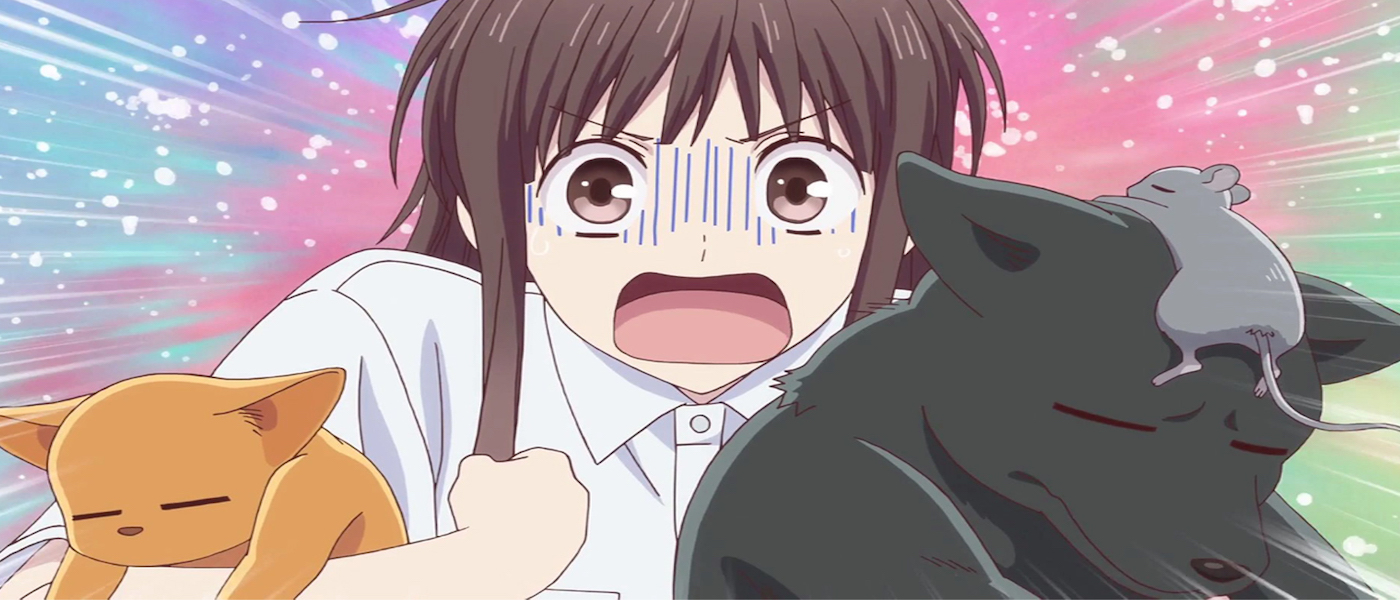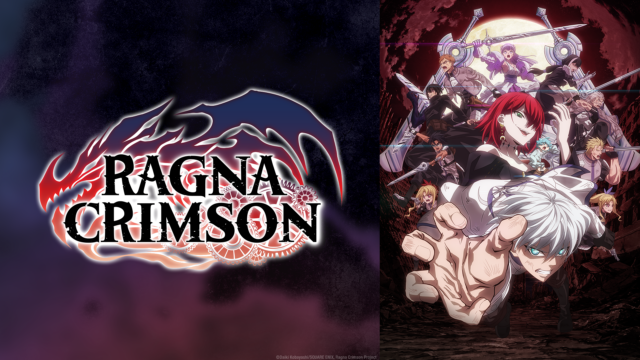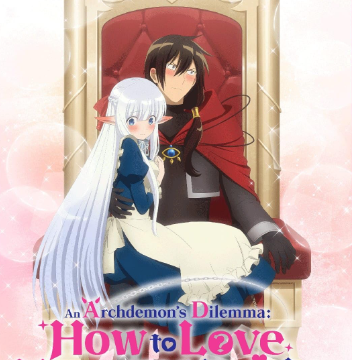English Dub Season Review: Fruits Basket Season One
Overview:
Life for precocious Tohru Honda has never been easy, but she currently faces a particularly sad lot. Orphaned and feeling lonelier than ever, Tohru feels lost and without purpose until she encounters the reclusive Soma family. This unconventional family let’s in Tohru with open arms. Tohru is grateful for the support and attention that they provide for her, especially when she learns that the Soma family guards an important secret. Every member of the family suffer from an unusual curse that turns them into one of the twelve animals of the Chinese Zodiac whenever they’ve embraced by a member of the opposite sex or experience intense stress. As Tohru and the Somas grow closer together, they slowly aid each other through love and life, becoming stronger in the process. This tender coming of age and love story is Fruits Basket.
Our Take:
This second attempt at Fruits Basket is much more faithful to the original manga and has won over fans where the original couldn’t. It’s almost a little surprising to see just how hard everyone’s gone in on this Fruits Basket revival. This first season received a hearty 25 installments, and there’s a second dose of the same that’s already been confirmed. Where the original anime had to be brief and cut corners are now opportunities where the series can take its time to breathe. It truly wants you to get comfortable with Tohru and company as you spend a leisurely two dozen episode with these characters.
Fruits Basket does a lot of things right and it features a creative enough spin on the standard “reverse harem” formula. However, Fruits Basket feels especially slow-paced with low stakes. This is a gentle romantic comedy series that’s about noticing that someone blushed or that the right suitor gave someone a gift. A lot of this has to do with the fact that Tohru is exceedingly wholesome and most of the series is filtered through her naive perspective. Tohru isn’t by any means a bad character, but it does often feel a little ridiculous that this character is who captured the hearts of the Soma family.
Over the course of these 25 episodes Tohru becomes further indoctrinated into the Soma family, slowly gaining both more independence and a sense of community in the process. There’s definitely a tug of war aspect to each new character vying for Tohru’s attention as the others bristle. This does become formulaic and fall in the pitfalls of standard slice of life fare, but it never stops being enjoyable. The characters are all fun enough to exceed their trappings.
As Tohru gets to know everyone she’s pushed out of her comfort zone and goes on some entertaining adventures throughout the season. The first season covers Tohru’s tribulations through her school year as well as the various events and festivals that the changing seasons hold. Every holiday is an adorable delight, but Tohru’s trip to the hot springs for “White Day” is a particularly satisfying and heartfelt highlight from the first season. Any episode that digs into Saki’s history and fills in further details on the Soma family’s past is also a home run.
Fruits Basket prides itself in its romance, but it also pushes a gentle, yet effective, sense of humor. This is actually a funny series when it wants to be. In fact, Fruits Basket will often surprise you with just how funny it can be at times due to the typically casual energy that the series occupies. Much like the shape-shifting characters within the series, Fruits Basket is built on extremes. There’s a very absurdist, manic atmosphere that rears its head every so often. Fruits Basket is often at its best when this Jekyll/Hyde effect of sensibilities is in play. It’s very sweet when Tohru goes on a tender picnic with Yuki, but it’s even better when an over the top battle breaks out or the house verges on destruction due to a simple squabble. Just like how Tohru slowly gets out of her shell, Fruits Basket also loosens up and allows itself to become outrageous when the time is right.
There are plenty of anime out there that trade in zany “transformation comedy.” Fruits Basket isn’t the best in the category, but its outlandish metamorphosis help educate about the Chinese Zodiac in fun, unconventional ways. Make no mistake, Fruits Basket is hardly a primer on the history of the Chinese Zodiac, but you may be surprised with how much you actually learn through this series.
Fruits Basket is very pretty to look at and its pastel, gauzy color palette is perfect for a show of this nature. Animation studio, TMS Entertainment, creates something pretty here, but it’s hardly groundbreaking in its look. If anything, Fruits Basket has a very by-the-numbers look that makes it easy for it to blend in with its competition. Thank God it has people transforming into animals! On that note, these transformations add a little flair and special effects to the mix. They look better than in the original series, but it’s still pretty standard.
The voice acting in Funimation’s dub of the series is quite a triumph. Most of the original cast has been assembled to reprise their roles, but they now approach these characters slightly differently. You can tell how excited performers like Laura Bailey, Eric Vale, John Burgmeier, and Jerry Jewell are to return to these roles. Justin Cook’s work as Hatsuharu Soma is especially enjoyable in this newly expanded capacity. It’s thrilling to see these actors tap into new layers of their characters and give even richer performances. There are also plenty of new characters here that didn’t appear on the original adaptation. Everyone rises to the occasion here and it’s encouraging to know that these voice actors will get even more time to develop these roles. They really create a sense of affable chemistry between these oddballs.
Fruits Basket is a success of its genre and it’s reached a larger audience now than before. It’s a reboot that justifies its existence, but I can’t help but think that the same approach taken to something like Love Hina or even Ranma ½ would be more worthwhile. This is a good anime series, but it’s also a very standard one. Hopefully the following 25 episodes will get a little more ambitious in their aim and storytelling.
2019’s revival of Fruits Basket is a sterling adaptation of its source material that will make fans of the manga and original anime series ecstatic. Newcomers will still have plenty to love here, but viewers’ enjoyment will largely come down to their relationship with the “reverse harem” anime sub-genre than the series itself. The show’s first season does an excellent job introducing over a dozen unique characters and this is definitely a series that deserves more time to flesh out its story. With the fun, playful introductions out of the way, Fruit Basket’s second season can only improve upon what’s already a very enjoyable formula.



























Hi Ashley, thank you so much for reading and we love the feedback. Note that on that day we had 14th posts go up and only ten posts show on the front page, so it's possible the preview had already been archived by the time you got to it. One recommendation would be to add our RSS feed to your favorite news aggregator service like Feedly, this way you get all of the latest posts!